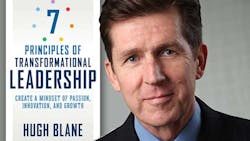3 Questions to Transform Your Thinking and Your Performance
What if higher performance had nothing to do with higher education? What if the value of your education became a career limiter as opposed to a career accelerator?
A recent Wall Street Journal analysis of college level critical thinking skills found that many colleges make a minimal impact on the critical thinking skills of their students. The CLA+ test measures a freshman’s critical thinking upon arriving on campus compared to their last year in college. The results are not promising and point to the fact that all too many students are earning their degree but not learning how to think critically or solve problems.
The same holds true in corporate America. Employees enter the world of work, pay their dues and end up unable to make a meaningful difference in their company’s well-being. Not because they are incompetent, but because they are ill prepared to think critically about their performance or their employers.
Here’s a critical thinking experiment. What if you could have unparalleled success at work and supreme satisfaction at home? What if you could have a flourishing bottom line without an unrelenting focus on finances? What if everything you thought about human performance was wrong?
What if the core value inside our organization was to ensure dramatic customer success? What if we ruthlessly eliminated anything and everything that did not enable customer success?
—Hugh Blane
Asking questions with the words “what if” challenges our predetermined thinking patterns and requires us to think differently. It did for Roger Smith when he asked “What if we could deliver small packages on a regional basis faster and more reliably?” It did when James Dyson asked, “What if a vacuum cleaner used cyclone technology to clean carpets instead of suction?” Asking “what if” questions created a FedEx valuation of $52 billion and a personal net worth for James Dyson of over $4 billion.
What can you learn by asking more “what if” questions? You’ll learn that “what if” questions set the stage for transformational work. For example, here are three “what if” questions I help my clients answer.
Transformational Question #1.
What would happen if we embraced the word love as a transformational word at work? Not like, not enjoy, but love. Love is not used at work because it’s thought to be too touchy-feely, but infusing love into the day-to-day work vocabulary is powerful. It’s powerful because love is a transformational word. When we love someone we do all we can to make their life better. When we love an idea we pursue it with an almost reckless abandon.
That begs the question, what if we were to articulate an idea, dream, hope or aspiration that’s grabbed hold of us and won’t let go. If you do, it changes every aspect of your leadership. Gone would be the acceptance of underperformance and in its place would be an almost missionary zeal for doing work that makes a difference in the world of work.
Transformational Question #2.
What if we became known for only doing work that is highly differentiated and enthusiastically contagious? What if our talent management systems became a catalyst for each employee achieving mastery and excellence? What if every employee truly committed to our idea and brought their very best to the workplace? Without loving your work you will never do any of the above and will be destined for underperformance.
Transformational Question #3.
What if we jettisoned our commitment to methodology (how we do things) and fell in love with value (what delights customers and makes them successful)? What if the core value inside our organization was to ensure dramatic customer success? What if we ruthlessly eliminated anything and everything that did not enable customer success? That means in accounting, human resources, sales, marketing, customer service, operations - everywhere. What if there was a ruthless and relentless focus on only doing work that delighted a customer and made them successful?
When you articulate what you love, what you are excellent at doing and how your customer is better off for having worked with you, the rate of acceleration toward higher performance is astounding.
Now back to our original thought experiment about unparalleled success at work and supreme satisfaction at home. Is it possible to have both? Yes, but it has nothing to do with getting new and creative ideas into your thinking. It has everything to do with getting the outdated and ineffective ideas you have about higher performance out.
Which of the transformational “what if” questions above, if you could answer with a full-throated enthusiasm, would lead to higher performance? What would happen if you started on it today?
Hugh Blane is president of Claris Consulting. He is the author of 7 Principles of Transformational Leadership: Create Mindset of Passion, Innovation and Growth, and is a globally recognized performance expert hired to help organizations solve challenging business issues, strengthen personal and professional relationships, and execute on strategic initiatives faster and more reliably.
